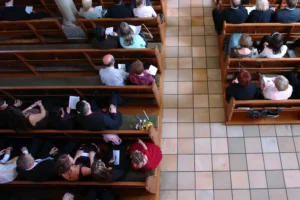Confession: I am a church nerd.
I love it. Growing up, I spent many a night under the fluorescent lights at Christmas play rehearsals and Sunday mornings teaching the preschool class. As a kid, church was a place where I went for community, a sense of family, fun on Friday nights, and the best chili cook-offs ever.
As a young adult, the church continued to intrigue me. I devoured books on church history, modern church trends and the global church. When God called me into ministry, it made perfect sense. I earned a degree in ministry and missions and began looking for church jobs, confident that Christ’s bride was the hope for a broken world.
Instead, God directed me into refugee relief ministry in Greece. I spent my days rocking Afghan babies to sleep and cooking meals with their mothers. I wrestled with the horrific stories I was hearing and learned to turn to God in moments of pain and hardship. When I returned to the States, church didn’t feel the same as it had before. I’m sure part of it was a cultural adjustment, but I struggled to feel connected. I tried out groups for single 20-somethings, only to discover that they were filled with college students who didn’t relate to life outside of school.
I tried to connect in other ways, but Bible studies for women were mostly scheduled during the day, which was inconvenient for someone who worked outside the home. Even serving seemed to get me out of sync. When I volunteered in the children’s ministry, I would miss the greeting time and lose opportunities to build relationships.
As I sat in church after church, looking for one to call home, a sinking realization took hold: I no longer seemed to fit in this place I loved.
The Other Fifty Percent
According to a recent Barna study, “one-quarter of singles (23%) would be motivated to go to church if they simply knew that anyone would be welcomed into the church community.” Our generation is hungry for spiritual nourishment and a purpose in life. Yet, many churches gear both programs and sermons toward married couples with children at home, even though over half of Americans ages 18-49 are single. My unmarried friends and I often joke that “Singles Awareness Day” isn’t February 14th, but each Sunday we have to go and sit in a pew by ourselves.
Our faith in Christ is the dearest aspect of our lives, and yet the places we go to share this and feel known can sometimes be the loneliest. I know that church is important, and I know that God wants me to connect with those in His body. That’s why I keep showing up. But simply “showing up” has sometimes made the pain run deeper.
When I realized how strained my relationship with the church had become, and even the ways in which I felt harmed, I knew I needed to take steps to mend it. Continuing to slide into the pew each Sunday wouldn’t fix the problem. Here are a few things that helped.
Be honest with God.
Throughout my journey of fitting in at church, I have felt the most comfort when I am honest with God. Because of Jesus’ sacrifice, I know I can “approach God with freedom and confidence” (Ephesians 3:12). Being honest with God about the painful feelings I am experiencing in relationship to the church brings freedom. I have found it helpful to take a walk and pray, journal or just sit quietly by a body of water and tell God what is going on. Often, I come away feeling that what grieves me about my experiences at church, also grieves Him.
In the New Testament Jesus reveals His dream for the church — an inclusive and united gathering of Christ-followers. Paul writes, “For in one Spirit we were all baptized into one body — Jews or Greeks, slaves or free — and all were made to drink of one Spirit” (1 Corinthians 12:13). What a beautiful picture. I have had to remind myself that when churches exclude certain types of believers, even if it’s unintentional, they are not following God’s design for His body. Just as our body needs each limb, organ and nerve to properly function, the church needs every age, marital status, race and gender to fulfill its purpose.
Call out harmful messages.
If you are single, you may have heard hurtful statements about your marital status at church. I have heard many sermons where a pastor equated God’s love for us to a husband’s love for his wife. Messages like this can leave me feeling like I will never fully experience God’s love until marriage. While marriage is a metaphor for God’s love for us, it isn’t the only way the Bible describes His affection for us.
Other times well-meaning Christians have told me I’m single “so I can serve God more,” or that when I get married my “loneliness will go away.” Comments like these cause me to feel even more isolated and misunderstood. In the article “What the Single in Your Pew Needs From You,” Gina Dalfonzo writes, “[Singles are] routinely ostracized for lacking something that many of us very much wish we had.” For my relationship with the church to heal, I needed to recognize that some of the statements I was hearing simply were not true. Not only that, but the individuals telling me these things were not authentically representing the church. Still, the words crept into my heart, distorting my image of God and my relationship with His church.
I read through the Gospels and paid attention to how Jesus interacted with those who are hurting. I imagined Jesus interacting with me. I thought about what He might say in response to my pain. What His tone of voice and body language would be like. Would Jesus say what that person just said to me? I realized that even when the people attending my church weren’t reaching out to me, God was.
Join the conversation.
It would be nice if others instinctively knew when we were in pain. But this usually isn’t the case. Since others can’t read our minds, we need to open up to people we trust when we’re feeling excluded. That person may be someone in your small group, a pastor or a friend. Pointing out a few ways others could help you feel more included also gives them tangible steps to serve you.
It may feel uncomfortable, but look for ways to insert yourself into the life of your church. Join a Bible study or small group, even if those meeting aren’t in your stage of life. Ask for help for a needed car repair or household project from someone with skills. Talk to your pastor about including sermon examples geared toward those without spouses or children. You could also volunteer in a ministry that has a mix of demographics, such as the missions committee, the welcome team or a pastoral group that visits the elderly.
It’s Worth It
Even if you’re taking steps to make the relationship between you and church better, be prepared that others may not understand your pain. In my journey, I have a found only a few people who are sympathetic and want to help me feel included. Others have expressed that I have unrealistic expectations.
If someone got married right out of college, they might not realize how lonely it is to always attend church by yourself. If someone is in the throes of parenting young children, they might not see the need to bring a single person to their dinner table. When pain and vulnerability are dismissed, feelings of isolation can grow. But keep moving forward. Bring your feelings to God, work to forgive those who have hurt you, and keep looking for someone who will understand.
My journey of finding my place in the church is not finished. With each new life stage, I will have new challenges and joys, and my relationship with the church will change. While I have been hurt, I recognize that the church is Christ’s bride; its members are my brothers and sisters. Jesus still has a big dream for His church. As Dalfonzo writes, “A church isn’t made up of family units and spare parts — it’s made up of people, all of them made in God’s image and worthy of fellowship.”
You, as a single or married person, are part of God’s family. You are called and included. And you are loved.
Copyright 2017 Lindsey Boulais. All rights reserved.












